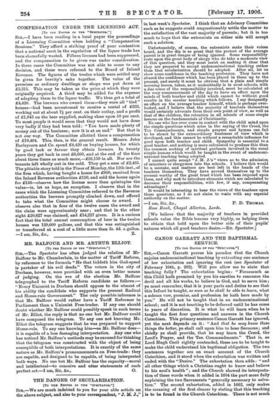THE DANGER OF SECULARISATION.
[TO THE EDITOR OF THE "SPECTATOR."]
Sin,—We are much indebted to you for your able article on the above subject, and also to your correspondent, "J. M. J.,"
in last week's Spectator. I think that an Advisory Committee such as he suggests could unquestionably settle the matter to the satisfaction of the vast majority of parents ; but it is too much to hope that the extremists on either side will accept such a solution.
Unfortunately, of course, the extremists make their voices heard, and the din is so great that the protest of the average parent is in great danger of being ignored. Some responsibility rests upon the great body of clergy who do take a moderate view of this question, and they must insist on making it clear that they are prepared to accept undenominational teaching rather than that secularisation should bo adopted. After all, let us show some confidence in the teaching profession. They have not abused the confidence which has been placed in them up to the present, and surely it must be obvious that a plain and simple morning lesson, taken, as it undoubtedly is in most schools, with a due sense of the responsibility involved, must be calculated at the very commencement of the day to have an effect upon the minds of both teacher and child which cannot be without good results in the secular teaching which follows. I say designedly an effect on the average teacher himself, which is perhaps over- looked, and I believe that the majority of teachers themselves would certainly advocate from their own point of view, as well as that of tile children, the retention in all schools of some simple lessons on the fundamentals of Christianity.
No one who has ever come in contact with the child mind upon the simple questions which arise in tho saying of the Creed, the Tea Commandments, and simple prayers and hymns can fail to be struck by the extraordinary freshness of view which is developed, and this cannot be without a remarkable influence for good upon both teacher and child. Sympathy is essential to a good teacher, and nothing is more calculated to produce this than the common seeking of spiritual guidance involved in the usual simple lessons which would be taught in the event of undenomi- national teaching being adopted.
I cannot quite accept "J. M. J.'s" views as to the admission of ministers or clergymen into the schools. I believe this would be a mistake, and matters are best left in the hands of the teachers themselves. They have proved themselves up to the present worthy of the great trust which has been imposed upon them, and why seek to introduce elements which are calculated to decrease their responsibilities, with few, if any, compensating advantages P
It would be interesting to hear the views of the teachers upon these questions, as I do not claim to witite with any especial authority on the matter.
—I am, Sir, Sze., P. D. THOMAS.
Bose Bank, Chapel Allerlon, Leeds.
[We believe that the majority of teachers in provided schools value the Bible lessons very highly, as helping theiñi to obtain that hold upon the better side of their pupils' natures which all good teachers desire.—En. Spectator.]










































 Previous page
Previous page